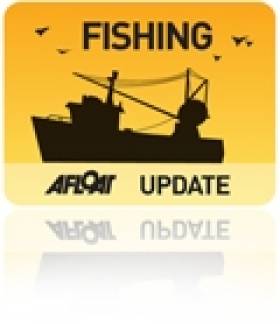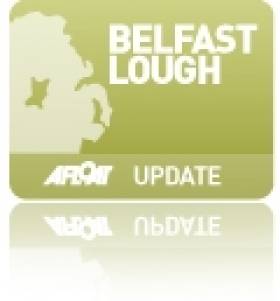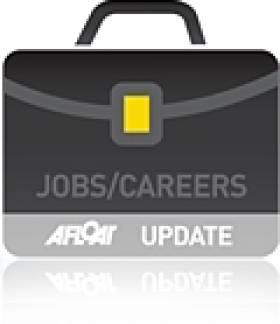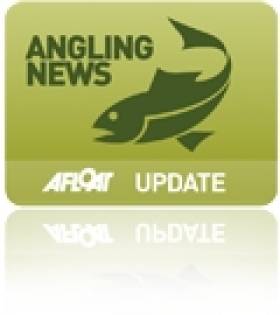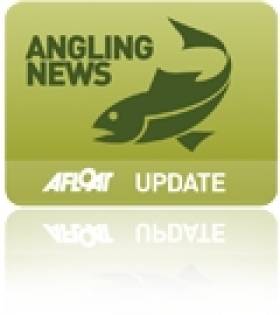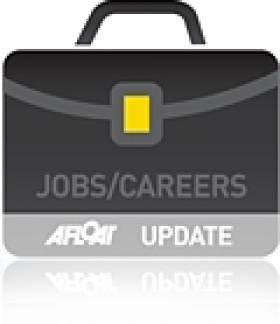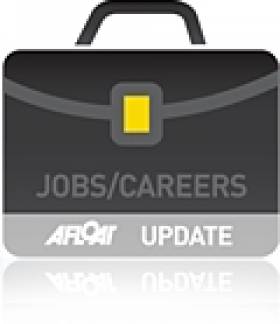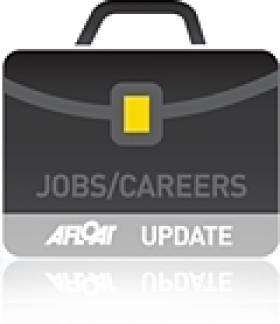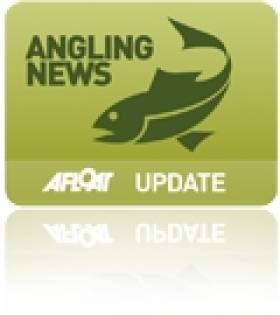Displaying items by tag: jobs
BIM to Hold Public Tender for Galway Bay Fish Farm
#FISHFARM - Bord Iascaigh Mhara (BIM) is set to hold a public tender process for the development of the proposed deep sea fish farm in Galway Bay, according to The Irish Times.
Financiers around the world have expressed interest in the 500-hectare organic salmon farm to be located off Inis Oirr in the Aran Islands, though BIM said it was not at liberty to disclose who they are.
As previously reported on Afloat.ie, the proposed fish farm would be the largest of its kind in Europe, set to double the State's production of organic salmon.
BIM says it is already receiving inquiries for jobs from emigrants wishing to return home.
However the scheme has faced opposition from Inland Fisheries Ireland (IFI) and local anglers, who cite the potential threat to wild salmon numbers in the area.
IFI recently issued a statement regarding its submission on the project's Environmental Impact Statement, raising concerns about the scale of the development and the impact of sea lice - infestations of which are often concentrated by aquaculture.
The public consultation that began in mid-October is scheduled to conclude next Wednesday 12 December.
Belfast Harbour Gets New Wind Turbine Building Hub
#BELFAST LOUGH NEWS - A new hub for wind turbine manufacturing at Belfast Harbour is expected to the completed by the end of this year, as the Belfast Telegraph reports.
The 50-acre reclaimed site on the shores of Belfast Lough chosen by Danish energy company DONG has apparently been kept vacant or more than 50 years awaiting the right development.
When operational early next year, the new 'offshore wind logistics terminal' - which will produce wind turblines for the West of Duddon Sands Wind Farm in the Irish Sea off Cumbria in north-west England - is expected to create 300 jobs in the growing renewable energy sector. Meanwhile, 150 workers will be needed for the construction phase.
A spokesperson for Belfast Harbour described the £50 million (€63.2 million) project as "the largest ever in Belfast Harbour's 400-year history" and "a major vote of confidence" in the harbour's long-term investment strategy.
The Belfast Telegraph has more on the story HERE.
Royal Cork YC Seeks Membership Administrator
#JOBS & CAREERS - The Royal Cork Yacht Club is currently recruiting for a 'Membership Administrator' with responsibility for overseeing the club's front of house operations and administering its social media presence.
Based at Crosshaven in Co Cork, the club's ideal candidate will be capable exhibiting personal initiative in dealing with club members, event competitors, suppliers and the general public.
Coupled to significant interpersonal and social skills, they will also possess advanced levels of computer literacy and be able to demonstrate experience and proficiency in website management, updating weblogs, managing Facebook pages and Twitter accounts.
The closing date for receipt of applications is next Friday 31 August 2012. Full details on this position are available HERE.
Royal St. George Yacht Club Seeks 'Events Manager'
#JOBS – Dun Laoghaire's Royal St. George Yacht Club is seeking an Events Manager. The job involves the management and co-ordination of the smooth operation of the catering-events office, with main responsibility for the coordination of the Club's major sailing events, weddings, private functions, and meetings. The demanding and rewarding role requires an energetic and driven individual according to the yacht club who want the position filled in time for the ISAF Youth Worlds at the club in July. More details below.
General Scope and purpose:
Liaise with Members and Event Organisers in the planning and organisation of Weddings, Major Sailing Events and ad hoc Social Events.
Communicate and market the Club's social programmes, dining options and private function facilities (weddings and corporate) and, in doing so, support the General Manager, Sailing Manager and Catering Office in achieving performance targets.
Promote the function business of the Club to Club Members.
Reporting to the General Manager.
Main Duties:
As the catering contact for the Club, to ensure that all catering enquiries are dealt with in an efficient and professional manner while liaising with the primary contact/ organiser to ensure that all his/ her requirements are met and the correct booking procedure carried out at all times.
To work with the General Manager in developing the Function Business in the Club. This is to include corporate and wedding business.
To be responsible for updating and maintaining the Club's 'function diary'.
Produce weekly function sheets and 'Banquet Event Orders' for each Club event and hold weekly briefing meetings with the Catering Operations Team to ensure the smooth running of all events within the Club.
To produce catering revenue forecasts every two weeks.
Participate in the organisation and running of the Club's major sailing events and in particular the Club's annual regatta, the junior regatta, the Dun Laoghaire combined regatta and the ISAF Youth Worlds in July 2012.
Promote the Club's bar and dining facilities to Members and their guests, through various forms of communication i.e. – posters, flyers, programmes, plasma screen, hymn boards, club emails and website with a view to increasing bookings and revenue.
Produce the Club's Spring, Summer and Autumn Social Programmes. This involves liaising, collating and drafting the programmes with all persons concerned to final completion.
Support the Social & Catering Committee in marketing and promoting the events outlined in the Spring, Summer and Autumn Social Programmes.
Keep the Club Website and additional micro sites up-to-date in regards to the Club's Social Events & News (the sailing section of the website is maintained by the Sailing Manager).
Use Social Media as a platform to keep in touch with Members – Twitter and Facebook.
Research markets to identify opportunities for events in the Club and develop new approaches for increasing and attracting the function business to the Club.
Competitive salary based on experience.
Please send a cover letter and curriculum vitae to Ann Gill, General Manager by email to [email protected] or by post to Royal St. George Yacht Club, Dun Laoghaire, Co. Dublin.
Draft Net Season Won't Be Brought Forward Says Minister
#ANGLING - Minister for Natural Resources Fergus O’Dowd has confirmed that there is no proposal for the extension of the salmon draft netting season.
In response to concerns expressed by the angling community and highlighted by Derek Evans in The Irish Times last week, Minister O’Dowd emphasised that conservation and management of salmon and sea trout is key to protecting our valuable natural resources.
“Recent reports that the commercial season will be extended in certain rivers are untrue and I can confirm that for the 2012 season, the commercial fishing season remains as it was in all areas, with the River Suir still on a reduced season for snap fishing," said the minister.
"I am aware that confusion can arise due to the necessary extent of regulations in place. However, I am not considering any proposal for the extension of the commercial season."
The minister reminded that Inland Fisheries Ireland is the body that enforces Ireland's "extensive" fisheries legislation.
"IFI has offices throughout the country where advice can be sought. There is also a comprehensive and regularly updated website and information is also disseminated on Facebook and Twitter," he said.
Meanwhile, IFI chief executive Dr Ciaran Byrne said that the legislative code is regularly updated to ensure that Ireland's fisheries continue to be protected on the basis of information from IFI’s Standing Scientific Committee and IFI management advice.
“Only rivers with exploitable surpluses are open during the spring season and no fishery is open for commercial exploitation during this time," said Dr Byrne. "Fisheries that are classified catch-and-release or closed for salmon are now protected under bye-law 897 which prohibits the use of worms and the use of any fish hooks other than single barbless hooks.
"IFI’s priorities are maximising the return to Ireland, protecting sustainable jobs in isolated rural communities and promoting our wonderful angling resources," he added.
Survey to Assess Value of Irish Angling
#ANGLING - Inland Fisheries Ireland (IFI) has appointed Tourism Development International (TDI) to undertake a Socio-Economic Survey of Recreational Angling in Ireland.
The overall objective of the survey, which will run over the course of 2012, is to establish the current volume and value of domestic and overseas recreational angling in the country.
Pike, coarse fish, bass, salmon, sea trout, brown trout and sea anglers will all be invited to participate in what is described as Ireland's most comprehensive angling survey undertaken in decades.
The survey will inform IFI and its tourism partners in relation to the business of angling in Ireland and also enable improved strategic planning and decision-making in terms of product development and marketing.
"Anglers are the key to this survey," commented Minister of State for Natural Resources Fergus O'Dowd. "They know the resource and they understand the importance of sustainability. What anglers contribute to Ireland’s economy is unknown but I am certain that it is significant.
"Angling takes place in every river and lake in Ireland and all around our coastline. There is no town or village in Ireland that doesn’t have anglers."
He added: "It is imperative that the inland fisheries and sea angling resources are managed in the best way possible to ensure enjoyment for our local and visiting anglers, sustainable jobs in rural communities and maximising its potential to add to Ireland’s economy.
"Getting the right information from those most involved will greatly assist in improving the angling product."
The survey comprises two parts: a household survey and a survey of recreational anglers which will commence in April. Anglers will be met at fishing locations throughout Ireland and invited to participate there and then, or later by phone or online. IFI says that every effort will be made to accommodate participation.
- angling
- Inland Fisheries Ireland
- IFI
- Tourism Development International
- TDI
- survey
- SocioEconomic Survey of Recreational Angling in Ireland
- Pike
- Salmon
- Sea Trout
- brown trout
- coarse angling
- sea angling
- tourism
- business
- marketing
- development
- Minister of State for Natural Resources
- Fergus O'Dowd
- sustainability
- inland waterways
- jobs
New Maritime Jobs Board Launches
#JOBS – A leading specialist maritime job board has announced the launch of their new and improved global maritime job board www.JOB2SEA.com. The new JOB2SEA site has been designed to help jobseekers find the best maritime jobs and recruiters the best candidates.
JOB2SEA has been developed to provide a comprehensive online recruitment resource for the global maritime industry. To meet the diverse needs of both seafarers and shipping companies JOB2SEA consulted many of the leading names in the maritime industry to provide the best possible online recruitment solution. This resulted in a highly intuitive job board with deep social media integration, enhanced jobseeker profiles and an extensive range of recruiter services.
In the first two months JOB2SEA had outstanding results with more than 3,160 applications, over 45,000 unique visits and 330,000 page views. The simple-to-use navigation system has user experience in mind by only displaying live jobs from leading recruiters across the maritime sector. Jobseekers can create email alerts at the click of a button, sending the latest jobs directly to their inbox. JOB2SEA also helps jobseekers on the move with a fully mobile-optimised site allowing seafarers to search and apply for jobs from any location on a mobile device.
Accessing the best talent is a challenge for any business and with this in mind, JOB2SEA has a range of options to attract and engage jobseekers. Recruiters can choose from a broad range of job advertising inventory such as premium, homepage, video and sponsored jobs. To help stand out further, recruiters can also be included in the Recruiter A-Z directory with video profiles.
Originally the project was started by the Danish Maritime Officers, but in 2009 it was decided to establish an independent company JOB2SEA. In 2010 it was decided to recruit one of the pioneers in maritime online marketing, Jakob le Fevre, to redesign the strategy. Mr. le Fevre's vision was to resolve the vacuum in the market with a world-class job board featuring the largest range of maritime jobs globally. JOB2SEA is entirely free to use for jobseekers and companies can chose to operate on a case-by-case basis or set up a VIP Partnership.
Jakob le Fevre, Managing Director, JOB2SEA commented, "The maritime business has had a tendency to focus on nationality in the past, but this is changing as we speak. Ship owners and other companies working in the maritime sector focus on qualifications and want the best possible crew for both their ships and offices. Traditionally, the maritime job market has been fragmented and administered by hundreds of smaller platforms or magazines – normally focusing on one geographic destination. Job listings have been old-fashioned without any engaging functionality. At JOB2SEA we have learned from the general job market and have created a portal working in the same way as many other general portals. The important difference is JOB2SEA covers the entire global market and focuses 100 percent on the maritime industry."
In such a competitive market it is imperative to maintain an exceptional level of service for both jobseekers and recruiters. This is made possible by partnering Madgex who are the leading provider of innovative job board software. JOB2SEA will continuously add new features and functionality to ensure superior levels of user experience helping to increase application rates.
Marketing Administrator Required in Cowes
#MARINE JOBS – Cowes Yacht Haven in the UK is seeking a Marketing Administrator with knowledge of the marine and event management industries to fill a new role. The post is part time with flexible hours based at our Cowes office.
The company says the successful candidate will be an innovative individual with proven sales and marketing experience and a knowledge of social media, advertising, communications and event management. The role is focused on generating new business for our marina, boat yard and events centre facilities. Salary negotiable.
You can submit your CV by email to [email protected] or Alison Pocock, Cowes Yacht Haven Limited, Vectis Yard, High Street, Cowes, PO31 7BD by 24 February 2012
Boating based Jobs in Howth and the Royal Canal
#JOBS – Howth Yacht Club is seeking sailing instructors and Waterways Ireland is looking for contract staff to work the Royal Canal this Summer.
Howth Yacht Club is recruiting a sailing instructor team for summer sailing courses. Optimist, Laser, Feva and 420 and keelboat instructors are required for full/ part time summer sailing courses. Applicants should apply to [email protected] before 1st March and specify your area of interest.
Waterways Ireland is seeking proposals from employment (employment agencies to put in place an agreement to supply a variety of different categories of staff. As an initial tranche the waterways body is looking for ten general operatives to work the Royal Canal from the 1st March to 31st August. More here.
We'll post more sailing, boating and marine jobs news here as we have them.
National Disabled Angling Centre to Stay Open Pending Review
#ANGLING - The National Disabled Angling Facility at Aughrim in Co Wicklow is to remain open following an 11th-hour agreement last month, The Irish Times reports.
A deal reached between Fás, Siptu and the centre's staff will retain all 23 jobs with a 25% pay cut and see the premises stay open until a "review" is published in March.
Opened by then President Mary Robinson in 1996, the facility is operated as a Community Employment Fás scheme and has been an invaluable amenity for disabled anglers nationwide.



























